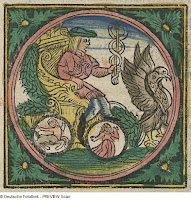WINGED WORDS WINDSDAY
Compiled by Rob Chappell (@RHCLambengolmo)
Vol. 1, No. 21: March 23, 2022
Editor’s Note
In Classical Greece and Rome, it
was believed that the nine Muses were the divinities who inspired people who
had devoted their lives to the pursuit of excellence in the arts and sciences.
Urania, the Muse of astronomy, is the “star” of this week’s feature, and her
“daughters” are women who have celebrated the wonders of the night sky in
poetry. Keep looking up!
From Paradise Lost: Book 7, Lines 1-20
By John Milton (1608-1674)
Descend from
Heaven, Urania, by that name
If rightly
thou art called, whose voice divine
Following,
above the Olympian hill I soar,
Above the
flight of Pegasean wing!
The meaning,
not the name, I call: for thou
Nor of the
Muses nine, nor on the top
Of old
Olympus dwellest; but, heavenly-born,
Before the
hills appeared, or fountain flowed,
Thou with
eternal Wisdom didst converse,
Wisdom thy
sister, and with her didst play
In presence
of the Almighty Father, pleased
With thy
celestial song. Up led by thee
Into the
Heaven of Heavens I have presumed,
An earthly
guest, and drawn empyreal air,
Thy
tempering: with like safety guided down
Return me to
my native element:
Lest from
this flying steed unreined, (as once
Bellerophon,
though from a lower clime,)
Dismounted,
on the Aleian field I fall,
Erroneous
there to wander, and forlorn.
The Muse Urania inspires the
Greek poet Aratus to write the Phaenomena, his classic poem on
astronomy. (Image Credit: Public Domain)
“Twinkle, Twinkle, Little Star”
By Jane Taylor (1783-1824)
Twinkle,
twinkle, little star,
How I wonder
what you are,
Up above the
world so high,
Like a
diamond in the sky.
When the
blazing Sun is set,
And the
grass with dew is wet,
Then you
show your little light,
Twinkle,
twinkle, all the night.
Then the
traveler in the dark
Thanks you
for your tiny spark,
He could not
see where to go
If you did
not twinkle so.
In the dark
blue sky you keep,
And often
through my curtains peep,
For you
never shut your eye
Till the Sun
is in the sky.
As your
bright and tiny spark
Lights the
traveler in the dark,
Though I
know not what you are,
Twinkle,
twinkle, little star.
“Stars”
By Emily Brontë (1818-1848)
Ah! why,
because the dazzling sun
Restored our
Earth to joy,
Have you
departed, every one,
And left a
desert sky?
All through
the night, your glorious eyes
Were gazing
down in mine,
And, with a
full heart’s thankful sighs,
I blessed
that watch divine.
I was at
peace, and drank your beams
As they were
life to me;
And reveled
in my changeful dreams,
Like petrel
on the sea.
Thought
followed thought, star followed star,
Through
boundless regions, on;
While one
sweet influence, near and far,
Thrilled
through, and proved us one!
Why did the
morning dawn to break
So great, so
pure, a spell;
And scorch
with fire the tranquil cheek,
Where your
cool radiance fell?
Blood-red,
he rose, and, arrow-straight,
His fierce
beams struck my brow;
The soul of
nature sprang, elate,
But mine
sank sad and low!
My lids
closed down, yet through their veil
I saw him,
blazing, still,
And steep in
gold the misty dale,
And flash
upon the hill.
I turned me
to the pillow, then,
To call back
night, and see
Your worlds
of solemn light, again,
Throb with
my heart, and me!
It would not
do—the pillow glowed,
And glowed
both roof and floor;
And birds
sang loudly in the wood,
And fresh
winds shook the door;
The curtains
waved, the wakened flies
Were
murmuring round my room,
Imprisoned
there, till I should rise,
And give
them leave to roam.
Oh, stars,
and dreams, and gentle night;
Oh, night
and stars, return!
And hide me
from the hostile light
That does
not warm, but burn;
That drains
the blood of suffering men;
Drinks
tears, instead of dew;
Let me sleep
through his blinding reign,
And only
wake with you!
“What Do the
Stars Do?
By Christina
Rossetti (1830-1894)
What do the
stars do
Up in the
sky,
Higher than
the wind can blow,
Or the
clouds can fly?
Each star in
its own glory
Circles,
circles still;
As it was
lit to shine and set,
And do its
Maker’s will.
“Stars”
By Marjorie Lowry Christie Pickthall
(1883-1922)
Now in the
West the slender Moon lies low,
And now
Orion glimmers through the trees,
Clearing the
Earth with even pace and slow,
And now the
stately-moving Pleiades,
In that soft
infinite darkness overhead
Hang jewel-wise
upon a silver thread.
And all the
lonelier stars that have their place,
Calm lamps
within the distant southern sky,
And
planet-dust upon the edge of space,
Look down
upon the fretful world, and I
Look up to
outer vastness unafraid
And see the stars
which sang when Earth was made.
“Stars”
By Sara Teasdale (1884-1933)
Alone in the
night
On a dark
hill
With pines
around me
Spicy and
still,
And a heaven
full of stars
Over my
head,
White and
topaz
And misty
red;
Myriads with
beating
Hearts of fire
That aeons
Cannot vex
or tire;
Up the dome
of heaven
Like a great
hill,
I watch them
marching
Stately and
still,
And I know
that I
Am honored
to be
Witness
Of so much
majesty.
“Arcturus”
By Sara Teasdale (1884-1933)
Arcturus
brings the spring back
As surely
now as when
He rose on
eastern islands
For Grecian
girls and men;
The twilight
is as clear a blue,
The star as
shaken and as bright,
And the same
thought he gave to them
He gives to
me to-night.
Arcturus is the fourth-brightest
star in the night sky as seen from Earth, prominent on spring evenings in the
Northern Hemisphere. (Photo Credit: NASA – Public Domain)


.png)
No comments:
Post a Comment
Note: Only a member of this blog may post a comment.